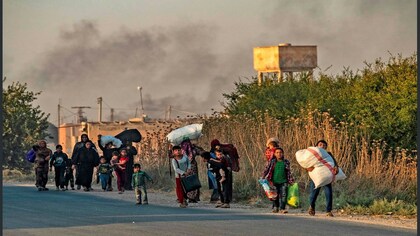How to Make Iran Change its Mind
21:12 - 24 March 2012

The West needs to persuade Supreme Leader Ali Khamenei to give up his nuclear ambitions voluntarily. A military strike won’t do that.
The Iranian regime can live without its nuclear program. But it can’t live without its economy, and the recently imposed sanctions, if continued, could turn into an existential danger for the Iranian regime by precipitating an economic collapse.
The sanctions imposed against Iran’s central bank in December 2011, which have started to dissuade an increasing number of countries from buying oil from Iran as they have to deal with the bank, are proving particularly damaging. These sanctions came in addition to a move by the EU that prompted the Society for Worldwide Interbank Financial Telecommunication (SWIFT) to discontinue offering service to Iranian banks. This means that from now on, Iranian banks won’t be able to send and receive money to and from the vast majority of banks abroad. Ultimately, this could mean Iranian businesses having to send suitcases full of banknotes to suppliers or abroad – or even to stop trading altogether.
A $900 billion economy simply can’t be run like this.
If there’s one thing we know about Iranian Supreme Leader Ali Khamenei it’s that nothing is more important to him than the stability of his regime. The West must therefore use the current economic weakness and diplomatic isolation of the regime as a tool with which to change Khamenei’s current nuclear policies.
First, though, it’s worth looking at what’s missing from the West’s approach to Iran: a clear message to Iran’s supreme leader that even if he does build a bomb, or just reaches a breakout capability, the sanctions and isolation won’t end. In fact, the opposite should be true: they will continue or even get worst.
Although Western intelligence agencies have suggested that Khamenei hasn’t actually made the decision to make a bomb, the price that he’s already paying for the nuclear program seems to suggest that he wants to reserve this option. Otherwise, why go through all this pain? His calculation appears to be that Iran can continue along its current path, paying a price for doing so, but that the costs of its continued defiance will end once he has made his decision and the country produces a bomb. After all, why would sanctions aimed at deterrence continue once Iran has secured a bomb? What would be the point? And with the end of the sanctions, Khamenei could recover by doing business with the rest of the world again.
But by making clear that sanctions will be continued even if Iran manages to build a bomb, the West will be sending a message to Iran’s leader that the sooner he reaches a deal with the West, the lower the economic cost will be. Similarly, if he decides to continue, the longer he waits, the more the country’s economy will pay. The regime can’t continue with the economic status quo indefinitely. If the economy collapses, nothing will be able to save it or stave off the regime-threatening instability that would come with it.
Sending this clear message could also encourage other influential players in Iranian politics, notably the Islamic Revolutionary Guard (IRGC), to pressure Khamenei now, rather than later. More than ever, the IRGC is these days very much about its business interests. It runs a huge business empire, which includes the real estate and construction sector, manufacturing, and a massive import empire reportedly worth around $20 billion annually.
It’s believed that these imports are exempt from tax and customs duty, but the IRGC could now be faced with the loss of much of its mini empire, with the SWIFT move making it difficult for it to pay its suppliers. Should the IRGC realize that the current sanctions really are open ended – or that they could get worse if Khamenei decides to go ahead and have a nuclear bomb constructed – expect Khamenei to come under pressure to change his nuclear policy now, rather than later. (And there’d be no better person to knock on Khamenei’s door than IRGC commander, Maj. Gen. Mohammad Ali Jaafari.
Still, it would be wishful thinking to believe that Khamenei, who is increasingly running the country as a kind of dictatorship, would be able to change his current nuclear policy without being offered a face saving compromise. Dictators are petrified of change, including Khamenei, who has invested so much of his regime’s legitimacy in the nuclear program.
To facilitate a compromise, the West will therefore have to offer Khamenei something. Allowing Iran to enrich uranium on its soil up to the 5 percent level would seem possible, under the condition that Iran answers all International Atomic Energy Agency questions, and opens its sites for strict inspection by the agency at all times. By making this offer, the West could energize those inside the regime, especially the IRGC business elites, who are unhappy with the price that they are currently paying for Khamenei’s nuclear policy.
Such a compromise would also make it easier for Khamenei to change course and accept U.N. and Western demands. It would also allow him to tell his constituents that that he got something in return for the pain that he has put the regime through.
The best outcome for the West and Israel would be to get Khamenei himself to change his current nuclear policy. War is very unlikely to do that. And there’s anyway another way. Making Khamenei realize that regime threatening economic pain is here is to stay even if he goes for the bomb, while also offering him a face saving way out, could bring about the result the West is looking for.
Source - THE DIPLOMAT
The Iranian regime can live without its nuclear program. But it can’t live without its economy, and the recently imposed sanctions, if continued, could turn into an existential danger for the Iranian regime by precipitating an economic collapse.
The sanctions imposed against Iran’s central bank in December 2011, which have started to dissuade an increasing number of countries from buying oil from Iran as they have to deal with the bank, are proving particularly damaging. These sanctions came in addition to a move by the EU that prompted the Society for Worldwide Interbank Financial Telecommunication (SWIFT) to discontinue offering service to Iranian banks. This means that from now on, Iranian banks won’t be able to send and receive money to and from the vast majority of banks abroad. Ultimately, this could mean Iranian businesses having to send suitcases full of banknotes to suppliers or abroad – or even to stop trading altogether.
A $900 billion economy simply can’t be run like this.
If there’s one thing we know about Iranian Supreme Leader Ali Khamenei it’s that nothing is more important to him than the stability of his regime. The West must therefore use the current economic weakness and diplomatic isolation of the regime as a tool with which to change Khamenei’s current nuclear policies.
First, though, it’s worth looking at what’s missing from the West’s approach to Iran: a clear message to Iran’s supreme leader that even if he does build a bomb, or just reaches a breakout capability, the sanctions and isolation won’t end. In fact, the opposite should be true: they will continue or even get worst.
Although Western intelligence agencies have suggested that Khamenei hasn’t actually made the decision to make a bomb, the price that he’s already paying for the nuclear program seems to suggest that he wants to reserve this option. Otherwise, why go through all this pain? His calculation appears to be that Iran can continue along its current path, paying a price for doing so, but that the costs of its continued defiance will end once he has made his decision and the country produces a bomb. After all, why would sanctions aimed at deterrence continue once Iran has secured a bomb? What would be the point? And with the end of the sanctions, Khamenei could recover by doing business with the rest of the world again.
But by making clear that sanctions will be continued even if Iran manages to build a bomb, the West will be sending a message to Iran’s leader that the sooner he reaches a deal with the West, the lower the economic cost will be. Similarly, if he decides to continue, the longer he waits, the more the country’s economy will pay. The regime can’t continue with the economic status quo indefinitely. If the economy collapses, nothing will be able to save it or stave off the regime-threatening instability that would come with it.
Sending this clear message could also encourage other influential players in Iranian politics, notably the Islamic Revolutionary Guard (IRGC), to pressure Khamenei now, rather than later. More than ever, the IRGC is these days very much about its business interests. It runs a huge business empire, which includes the real estate and construction sector, manufacturing, and a massive import empire reportedly worth around $20 billion annually.
It’s believed that these imports are exempt from tax and customs duty, but the IRGC could now be faced with the loss of much of its mini empire, with the SWIFT move making it difficult for it to pay its suppliers. Should the IRGC realize that the current sanctions really are open ended – or that they could get worse if Khamenei decides to go ahead and have a nuclear bomb constructed – expect Khamenei to come under pressure to change his nuclear policy now, rather than later. (And there’d be no better person to knock on Khamenei’s door than IRGC commander, Maj. Gen. Mohammad Ali Jaafari.
Still, it would be wishful thinking to believe that Khamenei, who is increasingly running the country as a kind of dictatorship, would be able to change his current nuclear policy without being offered a face saving compromise. Dictators are petrified of change, including Khamenei, who has invested so much of his regime’s legitimacy in the nuclear program.
To facilitate a compromise, the West will therefore have to offer Khamenei something. Allowing Iran to enrich uranium on its soil up to the 5 percent level would seem possible, under the condition that Iran answers all International Atomic Energy Agency questions, and opens its sites for strict inspection by the agency at all times. By making this offer, the West could energize those inside the regime, especially the IRGC business elites, who are unhappy with the price that they are currently paying for Khamenei’s nuclear policy.
Such a compromise would also make it easier for Khamenei to change course and accept U.N. and Western demands. It would also allow him to tell his constituents that that he got something in return for the pain that he has put the regime through.
The best outcome for the West and Israel would be to get Khamenei himself to change his current nuclear policy. War is very unlikely to do that. And there’s anyway another way. Making Khamenei realize that regime threatening economic pain is here is to stay even if he goes for the bomb, while also offering him a face saving way out, could bring about the result the West is looking for.
Source - THE DIPLOMAT



